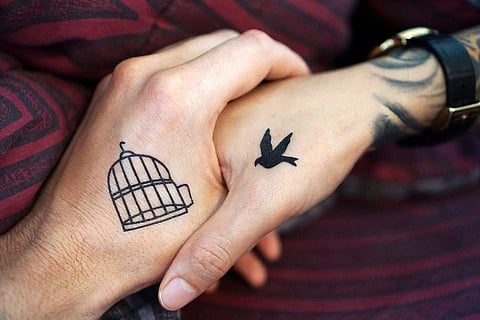

I promise you that the time will come, if you have tattoos, that you will regret your actions. They cannot be washed off. They are permanent. Only by an expensive and painful process can they be removed. If you are tattooed, then probably for the remainder of your life you will carry it with you
- Gordon B Hinckley, American religious leader and author
Despite such sane warnings as the one quoted above, tattoos are becoming a rage among actors, musicians and athletes — both men and women. A brief introduction on tattoos is relevant in this regard. It is a form of body imprinting where the design is made by inserting dyes and figments, either indelible or temporary, into the skin. The oldest figurative tattoos were discovered on two mummies from Egypt that were subsequently dated to around 2025 - 2018 BCE.
During the course of courting, many men and women appear to be in a hurry to tattoo their new-found lovers on their bodies. Though there is a choice of permanent and temporary tattoos available, they opt for the permanent ones to impress their current prospective brides/grooms. Unfortunately, in many cases there are divorces or remarriages, with the aforementioned tattoos ‘telling their unwanted tales of changing wives or husbands’. In this regard, there is a popular saying — Marry in haste and repent at leisure. This often happens in the case of the ‘love tattoo’ as well!
The latest addition to tattoo themes is that of memorial tattoos. An article published in the Sunday magazine of The New Indian Express (dated 4/8/19) by Urmi Chanda-Vaz, and excerpted here, traces the trend of memorial tattoos made with cremation inks to ‘immortalise’ lost ones, thus helping the bereaved to cope with their absence.
According to the author, Shetal, a businesswoman from Mumbai, has an abstract tattoo of a mother and her child on her arm. “Look closely — you can see my pulse near my son’s head,” she says. It was inked in memory of her 24-year-old son, Karan, who died in a bike accident in 2016. There is perhaps no greater grief in the world than a parent losing their child. It was no different for Shetal. People have different ways of dealing with personal losses, in order to hold and honour the memory of their dear departed.
For Shetal, it was a tattoo. Two months after Karan’s death, she decided to get a tattoo in her son’s memory. She went to her long-time tattoo artist and requested a cremation tattoo. Cremation tattoos are memorials of a special kind. A bereaved person requests the tattoo artist to add a very small portion of the deceased’s ashes to the ink. When the design is finally engraved, the skin becomes a living memorial by literally incorporating a loved one’s mortal remains into the survivor’s body. This is because of the fact that, to make the tattoo, a tiny amount of funerary ash is mixed with the tattoo ink.
Articulating the rationale of memorial tattooing, Shetal says, “His soul is with me, but I also wanted his physical form to be inside me, just like when I was pregnant with him.”
